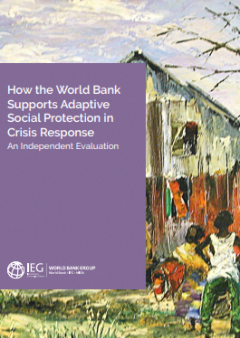
How the World Bank Supports Adaptive Social Protection in Crisis Response
Shocks and crises pose significant threats to human development, disproportionately affecting poor and vulnerable households. These shocks, whether natural disasters, economic crises, or political upheavals, often force households to resort to negative coping strategies, such as pulling children out of school, selling assets, or going hungry. To address these challenges, social protection responses need to be tailored to both immediate and long-term needs.
Contributions to Adaptive Social Protection Systems
During the evaluation period, the World Bank significantly contributed to the global understanding and financing of ASP systems. Its knowledge contributions were instrumental in shaping the ASP concept, while its lending has increased substantially, expanding across all regions with a focus on low-income and fragile countries. See more in chapter 2.
Performance of Social Protection Systems
World Bank – supported social protection systems have responded to different types of shocks over the past decade. However, shock response often fell short in coverage, timeliness, and adequacy, especially for sudden-onset shocks. See more in chapter 3.
Challenges and Success Factors
Key factors constraining systems’ ability to adequately address shocks include incomplete data systems, lack of interoperability across systems, low political buy-in for cash transfers during shocks, and lack of financial resources. Fragmented institutional landscapes and internal World Bank silos also hindered the effective implementation of World Bank – supported ASP systems. See more in chapter 4.
The evaluation offers three recommendations to prepare social protection delivery systems for faster and more comprehensive coverage in response to shocks, and to measure shock response for corrective action.
